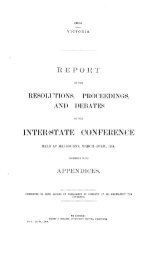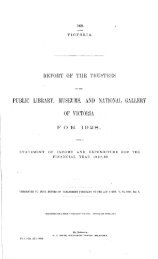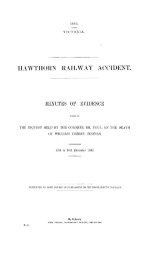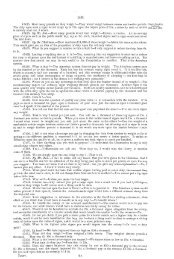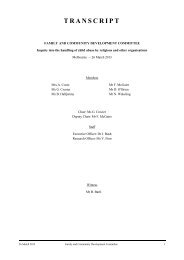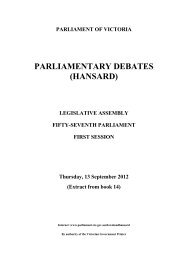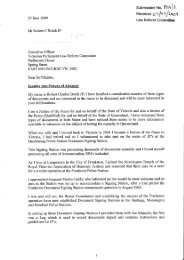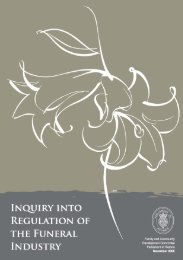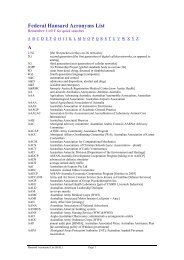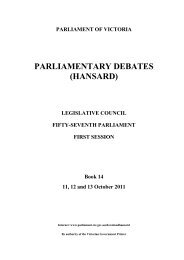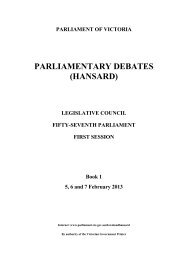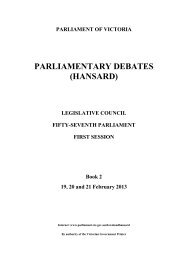Book 8 - Parliament of Victoria
Book 8 - Parliament of Victoria
Book 8 - Parliament of Victoria
Create successful ePaper yourself
Turn your PDF publications into a flip-book with our unique Google optimized e-Paper software.
CRIMES AMENDMENT (BULLYING) BILL 2011<br />
1546 COUNCIL Tuesday, 31 May 2011<br />
have to say many <strong>of</strong> them reflected the sorts <strong>of</strong><br />
behaviours that Brodie Panlock was subjected to in her<br />
workplace.<br />
In a motion we had a couple <strong>of</strong> weeks ago on JobWatch<br />
Ms Pulford was talking about several workers she knew<br />
who had been bullied — and in fact, I think, assaulted.<br />
If you pour something on someone, set them on fire, hit<br />
them or throw something at them, you have gone past<br />
bullying; you are assaulting someone. That is a much<br />
easier issue to deal with, because it is very clear in the<br />
Crimes Act 1958 that you cannot assault people. It is<br />
also pretty clear what assault is. It is a little bit harder<br />
with bullying. That is why during that campaign we<br />
were trying to raise this issue. Bullying was something<br />
that it had been said to us was occurring in the<br />
workplace.<br />
I found the helpline very distressing over the first two<br />
weeks. The campaign in fact went on for about six<br />
weeks, but it was very intense in the first two weeks as<br />
people called this helpline as a result <strong>of</strong> hearing about<br />
the campaign in the media or receiving one <strong>of</strong> our<br />
leaflets, which had the helpline number on it. That was<br />
in 2000, as I have mentioned. We are now in 2011, and<br />
this is still a very big workplace issue, which I would<br />
suggest has not been addressed anywhere near enough.<br />
Only just this year Trends in Bullying in the <strong>Victoria</strong>n<br />
Public Sector — People Matter Survey — 2004–2010<br />
was released. That was a survey, as the title suggests,<br />
taken between the years 2004 and 2010. The report on<br />
the survey, released by the State Services Authority, is<br />
unsurprisingly a very large document. In a section <strong>of</strong><br />
the executive summary entitled ‘Trends in bullying<br />
since 2004’ the report says:<br />
There has been very little change between 2004 and 2010.<br />
Around one in five People Matter respondents report having<br />
experienced bullying and one in three, witnessing bullying in<br />
their workplaces. This is despite the survey sample changing<br />
each year in composition <strong>of</strong> organisations and respondents,<br />
changes to the question wording … and the inclusion <strong>of</strong> the<br />
current definition <strong>of</strong> bullying …<br />
Members may recall me saying earlier that in the 2000<br />
ACTU survey in answer to the question <strong>of</strong> who does<br />
the bullying most people said the person who did the<br />
bullying was a manager, a supervisor or an employer<br />
and that only around 30 per cent said it was a coworker.<br />
In the ‘People matter’ survey, which covered the period<br />
2004 to 2010, in answer to the question about who<br />
people were bullied, by around 32 per cent — the range<br />
was 31, 33 and 32 — said it was a fellow worker and<br />
only 7 per cent said it was a group <strong>of</strong> workers. The type<br />
<strong>of</strong> terrible campaign that Brodie Panlock was subjected<br />
to therefore where a group <strong>of</strong> people gang up on one<br />
person, tends to occur less <strong>of</strong>ten, although it can <strong>of</strong><br />
course be the most serious type in terms <strong>of</strong> the effect on<br />
the person. It can tend to happen not so <strong>of</strong>ten but be<br />
very serious in its ramifications.<br />
In the ‘People matter’ survey the figures on the<br />
question ‘Who were you bullied by?’ were that 22 per<br />
cent reported having been bullied by the immediate<br />
manager and 21 per cent by the senior manager. If you<br />
add those two together, you get 43 per cent, so you are<br />
coming up to half <strong>of</strong> the survey respondents. This<br />
followed the very large ACTU survey results and the<br />
even larger ‘Stress at work’ survey results in showing<br />
that managers, supervisors and employers are the<br />
biggest perpetrators <strong>of</strong> bullying in the workplace.<br />
I raise this issue because it makes this matter difficult to<br />
deal with. Under the occupational health and safety<br />
legislation the employer has a duty <strong>of</strong> care to provide a<br />
safe workplace. The implication is that it is the<br />
employer’s duty — and it certainly was the employer’s<br />
duty in the Brodie Panlock case — to put a stop to the<br />
bullying. This is especially so if the employer knows<br />
what is going on — and the evidence presented to the<br />
coroner in the Brodie Panlock case was that the<br />
employer did know but did nothing to prevent it. It is a<br />
bit more difficult, however, when the employer is the<br />
perpetrator; in that case they must provide a safe<br />
workplace by stopping doing what they are doing. That<br />
is one <strong>of</strong> the cultural issues we have to deal with in<br />
terms <strong>of</strong> bullying in workplaces. We need to have a<br />
much higher recognition on the part <strong>of</strong> employers about<br />
what is appropriate behaviour on their part and what is<br />
not.<br />
Mr Pakula mentioned the support <strong>of</strong> the ACTU and the<br />
<strong>Victoria</strong>n Employers Chamber <strong>of</strong> Commerce and<br />
Industry (VECCI) for this bill and its proposed changes<br />
to the Crimes Act 1958. It is true the ACTU supports<br />
the bill, but ACTU president Ged Kearney also<br />
emphasised that while the ACTU supported the new<br />
laws it strongly believed employers must continue to be<br />
held responsible for the provision <strong>of</strong> a safe and<br />
harassment-free environment for all their workers. On<br />
12 April VECCI issued a statement saying that the state<br />
<strong>Parliament</strong>’s antibullying legislation should be used to<br />
create a federal model to ensure national consistency. It<br />
also wanted more details about the laws.<br />
In the first few years after the 2000 ACTU campaign,<br />
the ACTU was pressuring the National Occupational<br />
Health and Safety Commission to implement a national<br />
code <strong>of</strong> practice and national standards on what<br />
bullying in the workplace is and what is required <strong>of</strong><br />
employers and employees. The state trades and labour<br />
councils were also pressuring their various occupational



